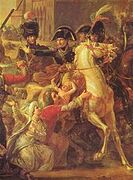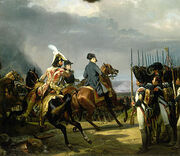
The greatest extent of Napoleon Bonaparte's conquests and establishments
The First French Empire, or the Napoleonic Empire, was formed gradually from the turbulence of the French Revolution and the unprecedented rise of Corsican general Napoleon Bonaparte.

The French coat of arms of the time
The War of the First Coalition []
Angered by the major powers' lenience towards Louis XVI and the overthrown French monarchy, France's revolutionary government declared war on Great Britain, Austria, Prussia, the Ottoman Empire, and the Iberian nations in 1792. Ostensively, the war seemed poised to be won by the allies, and it did go in their favor initially. However, when the National Convention put a young Napoleon Bonaparte in charge of the exhausted French army of Italy, the tide turned.

Painting of Napoleon as he's campaigning in Italy
Austrian armies were repeatedly stunned by the aptitude of the general, and ultimately conceaded. With the fronts with the other nations too stalemated to be of any assistance to Austria, the allies gave in to France in 1797. French Italian satellite states came about in the concluding Treaty of Campo Formio, and the Austrian Netherlands were also lost to France as a result.
The War of the Second Coalition[]

A decisive Napoleon victory at the Battle of Marengo
With a new body of revolutionary government in charge, the five-man Directory, Napoleon Bonaparte's command was now shifted farther east in yet another war with Europe's superpowers. As Napoleon sailed for British-controlled Egypt, he captured the island of Malta for France and overthrew the Knights Hospitallers. When he finally reached Egypt, he was at first met with good success; he defeated the Mamluk army at the Battle of the Pyramids and, occupied Cairo and Alexandria in 1800. Great Britain didn't waist trying to get back at the general, however, and in the same year, Admiral Horatio Nelson

Napoleon and his army entering Alexandria
destroyed the docked French fleet that had escorted Napoleon and his army. Marooned in Egypt, Napoleon diverted his attention to attacking the Ottoman Empire in Palestine. Having only failed in this campaign because of attrition, Napoleon sailed back for France, leaving his army behind and preparing for a coup de'tat of the Directory. This War of the Second Coalition ended with the Treaty of Amiens in 1802 and relatively preserved the status quo.
The War of the Third Coalition[]

The Battle of Austerlitz
It was in 1799 when Napoleon had his coup de'tat. Although he was met with fierce opposition, especially by the Directory, the publicly charismatic general got his way when a triumvirate that he dominated was formed in the wake of the Directory. The two men he was supposed to have balanced power with were Jean Jacques Régis de Cambacérès, and Charles-François Lebrun. In reality, Napoleon, as First Consul, overshadowed both of them and it soon became clear that he was basically the head of state of a new France. This was confirmed when he declared himself Emperor in 1804 after word broke out that the Bourbons had been plotting his assassination. The new emperor now had to deal with yet another coalition, which his most elusive enemy, Great Britain, had started in 1803. By 1805, the British had convinced the Austrians and Russians to join in, and they did so with a strive for vengeance. Having to abandon his planned invasion of Great Britain, Napoleon marched out to meet the Austro-Russian forces at Austerlitz. On the battlefield, Napoleon abandons the high ground of the Pratzen Heights, and the allies eagerly seize it themselves. Believing that Napoleon was in retreat, Czar Alexander I and Francis I of Austria ordered an attack on the ostensively weak French right flank. To their surprise, French reinforcements amerged from the fog to backup that very same right flank, which had, at that instant, become the strongest portion of Napoleon's whole army. Deceived and inexperienced, Alexander and his men panicked back up the Heights, but could not entrench themselves properly enough as the charging French came up from behind. The fighting was truly brutal and decisive, and by the end of

Napoleon crossing the Alps
the day, Francis and Alexander had had enough for one war. The only major French setback occurred at the Naval Battle of Trafalsgar against the British, which was again caused because of the actions of Admiral Horatio Nelson, who ended up dying in this battle; in the long-term, this hurt French overseas trade. In the resulting Treaty of Pressburg, Francis was forced to renounce his title of Holy Roman Emperor and most of Germany then fell under French dictation in the Confederation of the Rhine.
The War of the Fourth Coalition[]

Napoleon reviewing his troops at the Battle of Jena
The War of the Third Coalition's result for Germany was drastic. Now, much of the area was falling under Napoleon's influence with the Confederation of the Rhine, and very few of the former states of the Holy Roman Empire openly opposed France, except for Germany's second superpower, Prussia. Prussia and its king, Frederick William III, demanded that Napoleon abandon his hold on all land east of the Rhine River, or else there would be war. This didn't deter Napoleon, who was very willing to defend his claims on Germany. As a result, Prussia bred up a fourth coalition against France in 1806. Despite being up against one of Europe's mightiest militaries, which owes its quality to Frederick William I and Frederick "the Great", Napoleon crafted a plan to engage the Prussians and take their capital city of Berlin. This grand scheme unfolded with the Battle of Jena-Auerstedt, where Napoleon's army bested the Prussians decisively in that same year. Not only did he then occupy all of Prussia at lightning fast speed, but he once again crushed the Russians at the Battle of Friedland, and persuaded Czar Alexander to become his ally and join him in his Continental System, which was a massive embargo of France and its allies towards Great Britain; this Continental System was part of the reason why the U.S got involved in the War of 1812. The Treaties of Tilsit took half of Prussia's territory and incorporated it into the Confederation of the Rhine, and established the Duchy of Warsaw as a French satellite state. Napoleon now seemed more invincible than ever.

Czar Alexander and Emperor Napoleon meet at Tilsit
